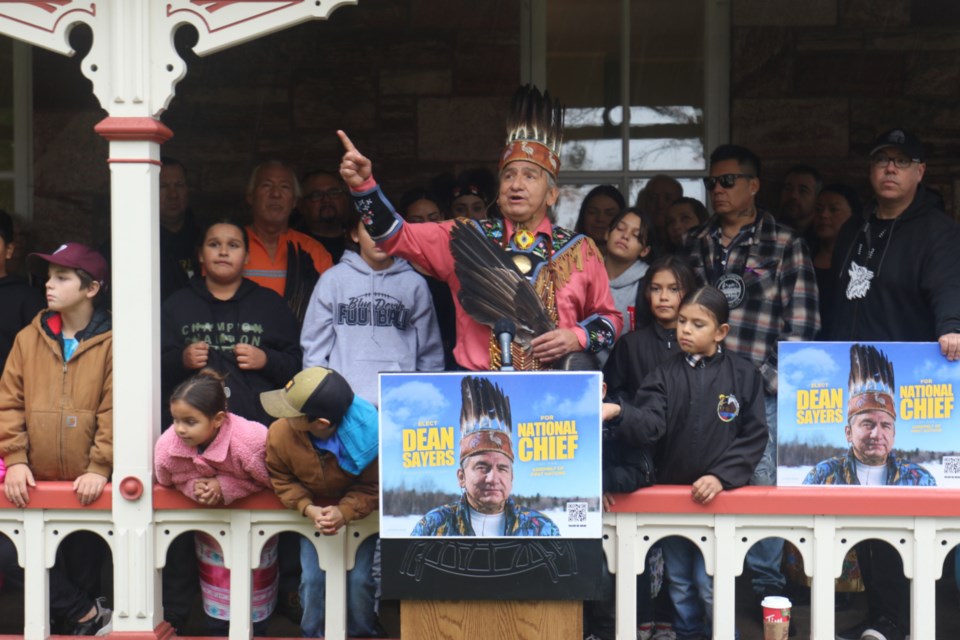BATCHEWANA FIRST NATIONS - He was the leader and public face of Batchewana First Nation for nearly two decades — and now, Dean Sayers has his sights set on leading the Assembly of First Nations.
Dozens of Anishinabek from both Canada and the United States gathered at the Sault Ste. Marie Canal National Historic Site Thursday to witness Sayers officially announce his candidacy for National Chief at the Assembly of First Nations (AFN), a national advocacy organization that works to advance the collective goals and aspirations of more than 630 First Nations across Canada.
Sayers said his unseating as longtime chief of Batchewana following band elections in July allowed him to “take a look at other opportunities to help improve the quality of life of Indigenous people, Anishinabek, across the lands.” After some “discussions with spirit, in ceremony” and talks with his family and First Nations chiefs across the country, Sayers made the decision to run in this year’s election for AFN National Chief, which is slated to take place at a special chiefs assembly in Ottawa during the first week of December.
“I am really compelled, and I am honoured to have the support of so many people to bring me to this role, and I am wanting to hear more from the chiefs,” Sayers told reporters following Thursday’s announcement.
Sayers will be on the campaign trail throughout Canada in the weeks leading up to the election in order to listen to First Nations leadership, as he believes there is no “one-size-fits-all” approach when it comes to First Nations, which all have their own treaties and agreements in place.
“We have to be reflective of that, and how we work with the new governments on our lands, Canada and Ontario and all the provinces,” he said. “I’m going to facilitate that, but I need to have more information from the chiefs, and those are things I’m travelling across the country to do — I’m travelling across the country to talk to the chiefs.”
The former Batchewana chief says there has to be changes made within the AFN itself, from unifying its political and administrative arms to the continuation of work on amending the AFN’s own charter.
“We need to make markable, measurable improvements — and that takes input from across the country, all the 600-plus chiefs need to have input in that,” Sayers said.
Sayers also signalled a desire to change the relationship between First Nations and Canada and what the buzzwords ‘truth and reconciliation’ actually mean to the governments who are often quick to use them.
“We need to have real action from those concepts that are so freely thrown about by all these governments across Canada. We will find our rightful place on these lands, and it’s going to take planning, education, strategizing and action,” he said.
A handful of First Nations leaders were on hand to congratulate and endorse Sayers, including the man who supplanted Sayers as chief of his community this past summer.
“He’s fought some hard battles in our territories with regards to logging, child welfare issues. It’s nice to see him running,” said Batchewana First Nation Chief Mark McCoy. “Batchewana First Nation wishes him all the best. I know that he can do the job — he’s experienced, he’s known across the country for pushing our treaty rights, our treaty issues.”
Netmizaaggamig Nishnaabeg (Pic Mobert First Nation) Chief Louis Kwissiwa said he’s known Sayers for a number of years, both in a political sense and on a deeper level from sitting with him in spiritual ceremonies.
“I know what he brings to the table; it’s for the people, it’s for the land, it’s for the treaties,” Kwissiwa told reporters. “It’s bringing back that cultural component, that spiritual connection to our people and bringing back that original way of life.”
Sayers will be on the campaign trail in British Columbia next week before heading to the Yukon.
“There’s a lot of work that can and will be done through the Assembly of First Nations, and I’m prepared to facilitate that — and my experience, I think, can move that yardstick,” he said.
